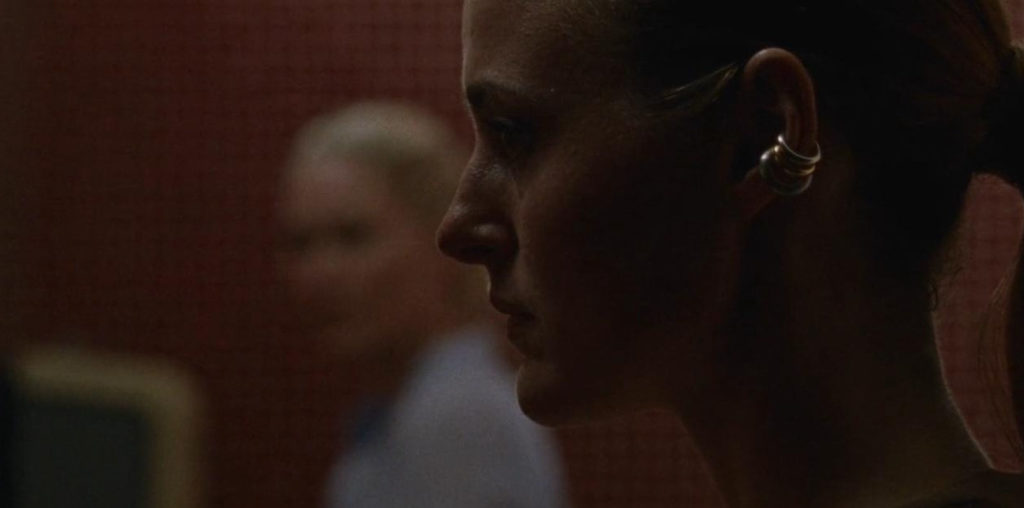
In this 2008 film by Avi Nesher, one of Israel’s most respected directors, Ania Bukstein stars as Noemi, a rather studious young woman living in Israel. Noemi is an exceptionally devout student of bible scripture. Before her arranged marriage takes place, she wants to go to a seminary in Safed for a while to complete her studies. Naturally, as the best student in class, she becomes teacher’s pet, and naturally she has two wacky roommates. One is a simple-minded pig who can’t stop stuffing her face, and the other is new to being religious, and commits every possible faux pas, although always with the best of intentions.
Their quad dorm room is rounded out with the late arrival of Michel (Michal Shtamler), a French Jew who has been sent to the Israeli seminary by her father, who hopes it will help assuage her bad behavior. Michel has the audacity to smoke cigarettes, use her cell phone, and mock Noemi’s continual quoting of scripture, astutely pointing out that Noemi must continually quote catch phrases because she doesn’t have any original thoughts.
Noemi and Michel soon meet Anouk (Fanny Ardant) another French expatriate who lives in Safed, and who has a strange relationship with the community. She is dying of both heart disease and cancer, so she receives charity from the convent, but she is also the source of much gossip since she once killed a man in France. The man was her lover, and was an artist for whom she abandoned her family. Anouk’s children will not speak to her. Adventurous Michel is fascinated by Anouk the pariah, due to the torrid nature of her history, and also due to their shared heritage. Uptight Noemi, on the other hand, is repulsed by this broken woman with an unforgivable past, but is committed to her charity work.
Fanny Ardant is, of course, one of France’s finest actresses. With Nesher’s steady and consistent direction, the two young women playing against Ardant in “The Secrets” more than hold their own.
As the two girls form an unlikely friendship, the uptight and pushy Noemi and the friendly if manipulative Michel hatch a plan to save Anouk’s soul before she dies. This involves doing all sorts of things that they ought not do, but Michel is able to convince Noemi of the nobility of their minor transgressions. The studious Noemi eventually peers into the Kaballah for help. In spite of its recent popularity among Hollywood-types, the Kaballah is among the most sacred and secret of Jewish teachings, and is considered unsuitable knowledge for all but the most advanced scholars of Jewish lore. Noemi, possessing a far deeper depth of knowledge than even her adult male superiors, is able to use the Kaballah to forge rituals that actually seem to help Anouk.
This is where this film starts to split off into three different tangents. First, we have Noemi exceeding her mandated boundaries, rejecting her uptight prat of an arranged fiancee, finding ambition to be the first-ever female Rabbi, and out-traditioning the most staid of traditionalists. Her rebelliousness isn’t in a rejection of her beliefs; she rebels because she isn’t allowed by tradition to take her faith far enough.
Then, on the second tangent, we have these four girls and one woman performing this weird ritual magic in an attempt to help someone who has murdered her lover, abandoned her family, and allowed nudie bondage paintings painted of herself. They wrap themselves in burlap and torture themselves while chanting arcanities around a fire.
Finally we have the wholly unexpected development of a full-on lesbian relationship between Noemi and Michel. (Noemi justifies it: man-on-man is forbidden by Jewish law, but the holy books say nothing about girl-on-girl).
Thus we have a layered and complex story that deals, ultimately, with feminism in 21st-century Orthodox Judaism. Noemi insists on choosing her own lover (of whatever sex she desires), of being an equal scholar to any man, and to show kindness and compassion to whomever she needs to – in this case, someone who has a pretty questionable past and who isn’t even a Jew. Her character is interesting in that she doesn’t see herself as a rebel, and in fact does everything that she does strictly to the letter of Jewish law. Maintaining tradition is crucial for her, but Michel shows her just how flexible the definitions of tradition need to be in our modern world. Between their sapphic relationship, their aid of Anouk, and the boundary-pushing of Noemi’s studies, Noemi has committed no literal transgressions. She has found love (an emotion revered in Jewish tradition), helped the needy, and positioned herself to become a leading scholar. And yet it is the context of these accomplishments that eventually make her as much of an outcast as the free-spirited Michel and the tragic Anouk are.
The film avoids a predictable Hollywood-type ending where everyone ends up with what they want. In fact, it could be argued that Noemi’s eventual fate is a punishment for her modern liberal behavior, but I preferred to see it as real life taking its course, and challenging her in ways that might only serve to strengthen her convictions in doing things her own way, on her own.
